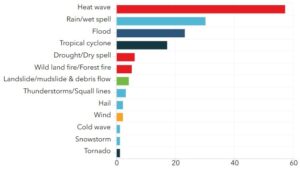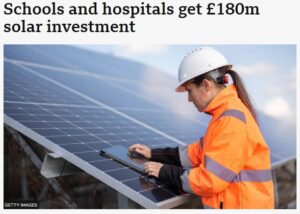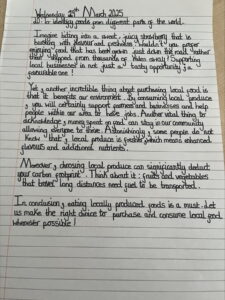Website – UKSSN Operations Group
LinkedIn – (3) UK Schools Sustainability Network Operations Group | Groups | LinkedIn
“Scientific evidence shows that even small increases in global temperature — every 0.1C — exacerbate risks of catastrophic impacts, such as more extreme weather events and irreversible tipping points” (Science-Based Targets Initiative)
😟 Why we need to act –
The World Meteorological Organization (WMO) published its annual ‘State of the Global Climate‘ report this week.

- The clear signs of human-induced climate change reached new heights in 2024, likely the first calendar year to be more than 1.5°C above the pre-industrial era, the warmest year in the 175-year observational record.
- The report underlined the massive economic and social upheavals from extreme weather and the long-term impacts of record ocean heat and sea-level rise. The report dashboard lists 151 unprecedented extreme weather events in 2024, meaning they were worse than any ever recorded in the region. Examples include heatwaves in Japan that left hundreds of thousands of people struck down by heatstroke. Soaring temperatures peaked at 49.9C at Carnarvon in Western Australia, 49.7C in the city of Tabas in Iran, and 48.5C in a nationwide heatwave in Mali. Record rains in Italy led to floods, landslides, and electricity blackouts; torrents destroyed thousands of homes in Senegal; and flash floods in Pakistan and Brazil caused major crop losses. Storms were supercharged by global heating, with an unprecedented six typhoons in under a month hitting the Philippines. Hurricane Helene was the strongest ever recorded to strike the Big Bend region of Florida in the US, while Vietnam was hit by Super Typhoon Yagi, affecting 3.6 million people.
😅Reasons for hope –
- The interim curriculum and assessment report recognised “global social and environmental challenges require attention to scientific and cultural knowledge and skills that can equip young people to meet the challenges of the future”. Rapid social, environmental, and technological change necessitates that the curriculum keeps pace, including a renewed focus on digital and media literacy, and a greater focus on sustainability and climate science.
- The net zero sector is growing three times faster than the overall UK economy, analysis has found, providing high-wage jobs across the country while cutting climate-heating emissions and increasing energy security. The net zero economy grew by 10% in 2024 and generated £83bn in gross value added (GVA), a measure of how much value companies add through the goods and services they produce. The analysis, by the Confederation of British Industry (CBI), found that 22,000 net zero businesses, from renewable energy to green finance, employ almost a million people in full-time jobs. The average annual wage in the businesses – £43,000 – was also £5,600 higher than the national average.
Hundreds of schools and hospitals across the UK are set to receive £180 million for solar panels from the government’s new state-owned energy company. The first major investment from Great British Energy was announced on Friday as part of government efforts to reduce the country’s planet-warming emissions.

- Almost half (49%) of all new EU city buses were zero-emission (ZE) in 2024, making city buses one of the early success stories of the European Green Deal.
- Ofgem is granting early access to nearly £4bn of investment in transmission equipment and services, in a move it claims will allow renewable energy projects in the UK to connect to the grid faster.
This week from UKSSN Ops Group –
- UKSSN Network Meeting: Fundraising and culture
- Communication: Pupil Voice
- Nature: Nature-based reporting and International Day of Forests
- Waste Management: Simpler Recycling
- ICT: Digital Cleanup
- Communication: Pupil Voice
- Energy Sparks programmes
- CPD Offers
- Celebrating sustainability: Sustainability Awards 🥳
- And finally…Earth Hour
- Plus: Advice and Support
🎓UKSSN Network Meeting – Fundraising and Culture🎓
Thank you to everyone who was able to join us last night for our monthly UKSSN network meeting. We know funding settlements for education are putting incredible strain on an already over-stretched system. Raising additional funds will be increasingly important if we are to achieve our climate ambitions. In response to our recent survey:
- 84% said they foresaw the need to fundraise within the next 3-5 years to achieve their climate goals, yet…
- 100% reported at least 1 barrier to fundraising

We need to address the barriers and gaps in fundraising ability to give our schools the best chance of success. Thanks to our speakers for sharing their knowledge and insight –
- Harry Eaves (Zenergi) for explaining and helping navigate the Low Carbon Skills Fund
- Justin Smith (Chameleon) for sharing his experience building a culture for fundraising (for sustainability) in schools.
- Ryan Green (Marcommed) on why and how communication is critical to fostering effective fundraising.
A recording of the meeting is available here.
🚸Communication: Pupil Voice🚸
Giving children agency and hearing their voice when developing a Climate Action Plan for your school or Trust is vitally important. Leaving children out of the conversation is a missed opportunity for teaching, for giving hope and optimism to the next generation, for engaging the wider community, and for hearing new ideas and perspectives. Below is a piece of persuasive writing I received this week from a year 6 pupil in one of our schools. It fills me with hope that hope that our schools and children are engaged in learning about sustainability and social value; it is now up to the adults to hear their voice and convert the energy of hope into action.

🦋Nature: National-based reporting🦋
Mandatory TNFD reporting and a GDP overhaul: How can UK policy help protect nature? – edie
New research from the Green Alliance has outlined steps the UK Government should introduce to improve and restore nature across the UK. One of the asks of the new report is for the Government to mandate corporate reporting on nature to motivate the private sector to invest in restoration practices. We also recognise the need for data-driven reporting on nature to help us measure progress. We have introduced two simple metrics:
- All schools to register and engage with the National Education Nature Park.
- All schools to agree specific SMART objectives for tree-planting (number), hedging (meters), wildflowers (sqm) and grey-to-green (sqm).
We have purposefully kept the metrics simple for ease of monthly reporting. Over time we will look to use tools to measure the impact of our work, both in terms of biodiversity and nature connectedness. We welcome ideas or suggestions to improve this type of reporting 💚.
Plus: On Wednesday 26 March (16.00-16.30) join the National Education Nature Park for another end of term round-up and find out more about the work they have been doing to support our schools.
🌳International Day of Forests
Today – 21st March – is International Day of Forests. We lose 10 million hectares annually due to deforestation and approximately 70 million hectares affected by fires. Protecting and restoring our forests is urgent and necessary: the well-being of the planet and future generations depends on them. Why not spend some time this weekend outside enjoying nature…a great reminder of what it is we are working to save.
♻️Waste Management: Simpler Recycling♻️
Simpler Recycling in England: policy update – GOV.UK
There are only ten days to go to the introduction of new rules on recycling. By 31 March 2025, schools and Trusts in England will need to arrange for the collection of the core recyclable waste streams, except for garden waste (glass, metal, plastic, paper and card, and food waste).
What is Simpler Recycling?
🔹The UK Government is implementing the Simpler Recycling Legislation to standardise recycling practices across England, aiming to make recycling more straightforward for businesses, households and non-domestic premises.
🔹This legislation will reduce confusion over recyclable materials and help promote the circular economy.
Reconomy Connect Head of External Affairs, David Gudgeon, and The Environment Agency, recently recorded a webinar on Simpler Recycling. Access the recording and helpful guide here: https://lnkd.in/e8ub_FPF
We have dedicated our next UKSSN network meeting to waste management…watch this space for more information.
💻ICT: Digital Cleanup💻
Digital Cleanup Day
Digital waste facts:
- In just one year (2007), one zettabyte of data was created worldwide. By 2010, this had doubled. In 2035, we will create more than 2,000 zettabytes. To print out one zettabyte of data you would need the paper from 20 trillion trees.
- In 2022, about 70 million servers were used to store data. Each one caused the production of 1–2 tons of CO2. In that year, about 20 million of them became e-waste.
- 99% of data was created within last 10 years.
- Limitless consumption of data today needs 3 times more energy than all the solar panels the world can produce.
- The Internet produces more than 900 million tons of CO2 each year.
- 90% of all data is never accessed 3 months after it is stored.
- 320 billion emails are sent every day and 62 trillion spam emails every year = 20 million tons of CO2.
- One email emits, on average, 4g of CO2 = the carbon footprint of a light bulb turned on for 6 minutes.
Each of these facts can be applied to schools and Trusts, whether the ICT policies we have in place for data retention, how we use email and communication tool or the hardware we procure and send to waste. The production of electronic devices consumes a lot of energy and requires precious and rare metals which need to be mined. A new smart phone can have a carbon footprint of over 75kg, but a laptop or desktop could be 4 times that amount. The biggest part of this comes from the manufacture of the product.
- Can we extend the life of equipment?
- Can equipment we buy be easily repaired?
- Can you buy refurbished devices?
- Do you have a plan for when you no longer need the device…have you thought about the whole-life cycle of the asset?
Engaging ICT in sustainability is a critical step in Climate Action Planning. Their expertise will be critical in helping you achieve your climate goals.
⚡Energy: Energy Sparks programmes⚡
Two of the biggest heating issues for are optimising the temperature and heating coming on too early. Energy Sparks has two programmes – alongside a lot’s more advice and guidance – that can really help.
- Smart schools stay at 18 degrees helps pupils to identify if their heating is set too high by measuring temperatures and working with the caretaker or estates team to reduce the temperature.
- Give your heating a lie-in, helps schools tackle this issue. The programme shows you how to use Energy Sparks to identify if your heating isn’t doing what you expect.
🎓CPD Offers🎓
DfE/ISBL Local Support Offer for Sustainability
Develop your skills across the board with our comprehensive ISBL-aligned training — ISBL
The DfE are funding in-person, practical training sessions focused on technical skills and knowledge, career development and pathways, soft skills, and capacity building. One of the eight sessions currently available is focussed on Sustainability. The sessions run for up to 3 hours and are available for up to 30 attendees per session. The training is available to trusts and regional network groups who are interested in facilitating a session for solely their own SBPs and/or colleagues within their region. This is a great opportunity to upskill and engage a group of school business leaders, estates, finance and operations professionals on sustainability and climate action.
If you are interested in finding out more information, please email: training@isbl.org.uk.
Carbon Literacy
Free Carbon Literacy training from Let’s Go Zero
25,000 people working in education are already Carbon Literate. There are more and more opportunities to take part in Carbon Literacy training in your local area (or online). Training our teams is often the first step in taking effective climate action. Plus…if you haven’t already signed up to meet with your local Climate Advisor I would urge you to make that the next step in your Climate Action Plan.
Plus:
In June 2025 Carbon Literacy Project will be releasing a new Schools Toolkit, which has been designed for school staff in Primary and Secondary School settings. The toolkit will be a fantastic way to support other educational settings in reaching their government mandated sustainability strategies, as well as supporting your own CLE goals. If you work with schools or school settings and are interested in using the materials for delivery, then get in touch at school@carbonliteracy.com.
Waterwise Water Literacy
Water Literacy | Accredited Learning Experience
Despite the UK’s rain drenched reputation, demand for fresh water increasingly outstrips supply. This creates a state of water scarcity, which has damaging environmental impacts. Despite this, water remains an undervalued, regularly wasted resource. We need a wave of change, and this course will empower you to be a part of it. Water Literacy is a learning experience to inspire, motivate and educate professionals to play their part in addressing the environmental impact of water scarcity in the UK. It is an informative, accessible, and action-orientated course. Through a single day of learning, participants are empowered to embed change at their organisations, at home, and in their communities.
People and Planet – Climate Action Plans – The Easy Way!
Select tickets – CLIMATE ACTION PLANS – The Easy Way! – Google Meet
An hour-long twilight session on 31st March at 16.00 offering all of the tools you need to create your school’s Climate Action Plan.
Sustainability Support for Education
Sustainability Support for Education. Events and Tickets | Eventbrite
Interactive workshops to help progress your climate action plan. Sessions will on Thursday 27 March at 4:30pm, Tuesday 1 April at 4:30pm and Thursday 3 April at 4:00pm (subject to availability).
Regional and National events
Conferences and events for climate and nature are great for CPD and building your network. We promote training on the website where all Members have facility to add local or regional events. Here are just a few more to look forward to –
- East of England Sustainability in Education Series with updates from DfE in Essex (26th March 2025) and Suffolk (2nd April 2025)
- The Trust Network national conference, Pelsall (23rd April 2025)
- Education Estates Net Zero Conference, LSE London (24th April 2025)
- Schools Sustainability Showcase, ARU Peterborough (22nd May 2025)
- ASCL Annual Sustainability Conference, Manchester (5th June 2025)
If you are planning an event let us know and we will share with colleagues in the network.
🥳Celebrating Sustainability: Sustainability Awards🥳
The Department for Education Sustainability Award is now open for applications (closing date 24th April). The award recognises institutions that have taken innovative, measurable, and impactful steps to embed sustainability within their operations, curriculum, and community. The winning school or college will receive a £2,500 award to further support sustainability initiatives. Awards for sustainability are great for showing other schools and Trusts what can be achieved.
And finally….Earth Hour (22nd March at 20.30)
This Saturday, 22nd March at 8:30pm, we have a powerful chance to unite for our planet. Join the #BiggestHourForEarth by switching off non-essential lights and dedicating 60 minutes to ‘Give an hour for Earth’. Use this time to do something – anything – positive for our planet. Whether you are a foodie, into fitness or entertainment, looking for something family-friendly, or simply want to take part from the comfort of home – there is something for you. Check out activities you can do anywhere or view specific activities in your location.
Have a great weekend 💚
Sources of advice and support
DfE sustainability hub: Sustainability Support for Education (with updated features for 2025 and updates in LinkedIn
UKSSN: UKSSN Operations Group
Education Nature Park: Home | Education Nature Park
Climate Ambassadors: Climate Ambassadors:
Turning Climate Ambition into Climate Action in Education | Climate Ambassadors
Let’s Go Zero: UK Climate Change • Let’s Go Zero
EAUC: The Platform – Environmental Association for Universities and Colleges, EAUC – United Kingdom
FED: FED | Climate Change
Good Estate Management for Schools – Good estate management for schools – Guidance – GOV.UK
Sustainable Drainage (SUDS) – Susdrain – The community for sustainable drainage
The Trust Network (TTN) – The Trust Network supporting good school estates & facilities management
References
HM Government Net Zero Strategy (October 2021, page 29)
‘Government is leading the way – embedding climate into our policy and spending decisions, increasing the transparency of our progress on climate goals, and providing funding to drive ambitious emissions reductions in schools and hospitals.’
https://assets.publishing.service.gov.uk/media/6194dfa4d3bf7f0555071b1b/net-zero-strategy-beis.pdf
Department for Education Sustainability and Climate Change Strategy (April 2022)
Sustainability and climate change strategy – GOV.UK
Streamlined Energy and Carbon Reporting (SECR)
Environmental reporting guidelines: including Streamlined Energy and Carbon Reporting requirements – GOV.UK
